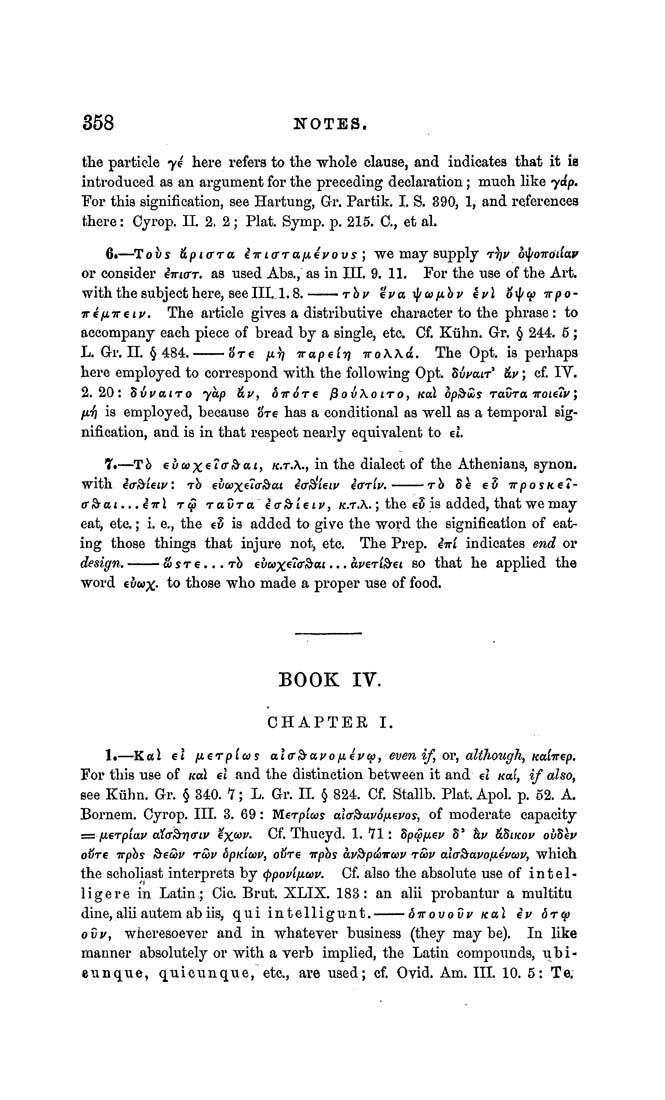358 NOTES.
the particle 7e here refers to the whole clause, and indicates that it is
introduced as an argument for the preceding declaration; much like ydp.
For this signification, see Hartung, Gr. Partik. I. S. 890, 1, and references
there: Cyrop. IL 2. 2; Plat. Symp. p. 216. C, et al.
6.—Tobs dpiffra iTrtffraptepovs ; we may supply r^p b^oTTdiiap
or consider eTrtCT. as used Abs., as in IH. 9. 11. For the use of the Art.
with the subject here, see 111.1.8.------rhp 'epa^^wpthp epl oi^cp Trpo-
TreptTreip. The article gives a distributive character to the phrase: to
accompany each piece of bread by a single, etc. Cf Kiihn. Gr. § 244. 5;
L. Gr. II. §484.------'6re pt)] Trapeir] TroXXd. The Opt. is perhaps
here employed to correspond with the following Opt. Bdpatr* dp; cf IV.
2.20: Bdvairo ydp dp, oTrbre fiodXoiro, Kal bpbuos radra Troielp;
pti] is employed, because 'ore has a conditional as well as a temporal sig¬
nification, and is in that respect nearly equivalent to et.
T.—Tb evwx^l<^^<^h K.T.A., in the dialect of the Athenians, synon.
with iffbietp: rh evwxelffbai iff^ieip iffrip.------Tb Be ed TTposKel-
ffbai...iTrl rep t a u t a e o* ;^ i e t j/, k.t.A. ; the eS is added, that we may
eat, etc.; i. e., the ed is added to give the word the signification of eat¬
ing those things that injure not, etc. The Prep, ctti indicates end or
design.------^ s t e... Tb evwxelffbai... dperibei so that he applied the
word eua>x« to those who made a proper use of food.
BOOK IV.
CHAPTER I.
1.—Kai el pter pi ws alff bap opt e pep, even if, ov, although, KaiTrep.
For this use of Kal et and the distinction between it and et Kai, if also,
see Kiihn. Gr. § 340. 7; L. Gr. IL § 824. Cf Stallb. Plat. ApoL p. 62. A.
Bornem. Cyrop. III. 8. 69: MeTptcos alffbavbptepos, of moderate capacity
= pterpiap atffb7]ffip exwp. Gi. Thucyd. 1. 71: Bp^ptep B* Up dBiKOP ovBep
ovre TTphs bewp rwp bpKiwp, ovre Trphs dpbpdoTTWp rcop alffbapoptepwp, which
the scholiast interprets by eppopiptwp. Gi. also the absolute use of intel-
ligere in Latin; Cic. Brut. XLIX. 183: an alii probantur a multitu
dine, alii autem ab iis, qui intelligunt.------oTrovodp Kal ip brep
odp, wheresoever and in whatever business (they maybe). In like
manner absolutely or with a verb implied, the Latin compounds, ubi-
eunque, quicunque, etc., are used; cf Ovid. Am. III. 10. 5: Te,
|








